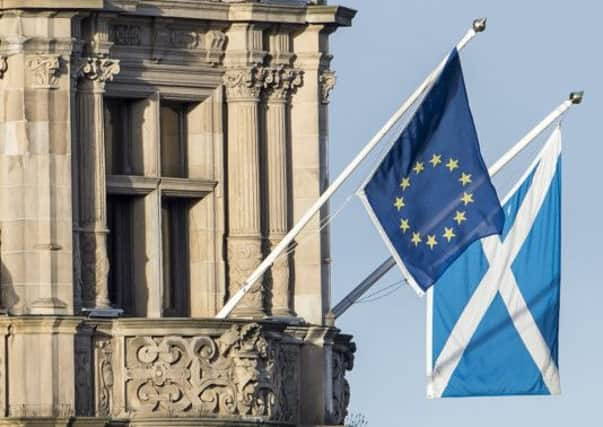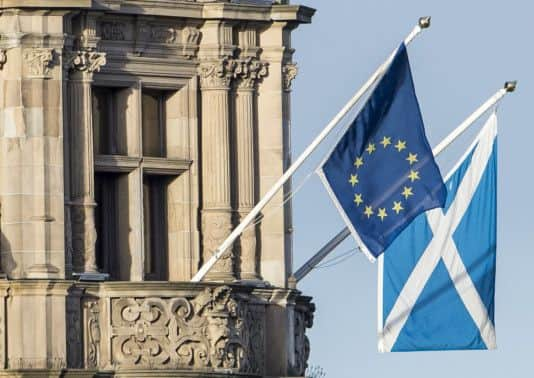Scottish independence: EU membership row continues


Deputy First Minister Nicola Sturgeon defended the policies, both of which have been thrown into doubt in significant interventions in the past week.
She rejected claims by European Commission president Jose Manuel Barroso that Scotland may find it “extremely difficult, if not impossible” to join the EU, arguing that he has no say in what would be a political decision for member states.
Advertisement
Hide AdAdvertisement
Hide AdAnd she emphatically insisted Scotland would use sterling as currency despite the clear warning from Chancellor George Osborne, and the two other main UK political parties, that an independent Scotland would be “walking away” from the pound.


The controversial issues reached the Scottish Parliament on the first day of business since Mr Osborne’s currency refusal on Thursday and Mr Barroso’s comments on Sunday.
Sturgeon - ‘Scotland in EU is not an EC decision’
Labour, Conservatives and Liberal Democrats all pushed Ms Sturgeon to explain why Scotland should expect an easy switch to EU statehood.
They also demanded to know how the SNP can promise a currency union if the other partner is not willing, and called for details of the cost to business if Scotland adopts a new currency.
On the EU, Ms Sturgeon said: “The decision on Scottish independence is for the Scottish people and the decision about continuing membership of the European Union will be for member states. These are not decisions for the European Commission.
“Of course, no member state has said it will seek to veto Scotland’s continuing membership.”
She described Scotland as a model European state and said refusing membership would be against the EU’s aims.
“We’ve contributed to the EU for 40 years but the suggestion is that simply as a result of exercising our democratic right to self-determination we would find ourselves outside,” she said.
Advertisement
Hide AdAdvertisement
Hide Ad“Not only is there no basis for that in the European treaties, or in common sense or the interests of the wider EU, or indeed in anything any member state has actually said, it would in fact be an absolute affront to democracy.
“I’d have thought any democrat, Yes or No, would have found that to be completely unacceptable.”
Denying Scotland continued membership would harm the EU, she claimed.
“Let’s not forget that we’re talking here about Scotland - Europe’s largest oil producer, the country with the biggest share of EU waters, the country whose renewable energy potential is key to the EU meeting its own renewable energy targets, a major exporter of premium products like whisky, and home to thousands upon thousands of EU nationals,” she said.
Labour - ‘Not for Yes camp to speak for others’
The exchanges were sparked by a question from Labour’s constitutional spokesman Drew Smith, who asked for a response to parliament about Mr Barroso’s comments.
“The problems the nationalist campaign has faced this week seem to be because of their failure to understand it’s not for them to assert the national interests of others,” he said.
MSPs also focused on the Chancellor’s argument that the rest of the UK would deny formal currency union with Scotland.
First Minister Alex Salmond, addressing a business audience in Aberdeen yesterday, highlighted an additional £500 million annual transaction cost to English business from a separate currency.
Advertisement
Hide AdAdvertisement
Hide AdHe called the extra burden a “George tax” as he attempted to “deconstruct” the UK Government position.
Unionist parties attacked the First Minister’s argument today by demanding to know details of the cost to business if Scotland adopts a new currency.
Conservative MSP Annabel Goldie, referring to a “Salmond tax”, said it is up to the SNP to spell out the costs to Scottish business.
But Ms Sturgeon said: “That’s not our proposal. One of the reasons we propose a sterling zone is so no English businesses nor Scottish businesses would have to incur transaction costs.”
Lib Dem leader Willie Rennie said Ms Sturgeon makes the case for the UK.
“She argues for the currency union, the Bank of England as a lender of last resort, they’re against transaction costs,” he said.
“I’m now pleased she now realises what we’ve been arguing for for a very long time.
“A nationalist banging the drum for keeping the UK as part of her argument for leaving the UK - hasn’t nationalist politics become a snake eating its own tail?”
Hyslop - ‘EU membership must continue’
Advertisement
Hide AdAdvertisement
Hide AdEarlier, External Affairs Secretary Fiona Hyslop said: “It’s clear that Scotland benefits enormously from our membership of the EU in every area of life - from trade and jobs to health.
“But the EU also benefits hugely from having Scotland as part of it - and it is simply not credible to suggest that an independent Scotland, which has been part of the EU for 40 years and already meets all membership requirements, would not be warmly welcomed.”
She added: “Our membership of the European Union must continue - but the Prime Minister has made it clear that there is a real possibility of Scotland being removed from the EU by a future UK Government.”